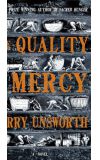
29 Sep 2011 01:20:00
The Quality of Mercy lingers over them obsessively. The action, constructed around the trial of the crew and a parallel civil case investigating Kemp's insurance claim against the value of the slaves who were "jettisoned" on the captain's orders before the mutiny, turns the second book into something close to an accounts ledger for the first. Sacred Hunger, which played out under the wide, warm skies of West Africa and Florida, was a book built on dreams: of profit for Mr Kemp Sr; of justice for the idealistic ship's doctor; of freedom for the slaves. In The Quality of Mercy, dreams have been thrown over in favour of financial reality; the brave, terrifying, hopeless events of Sacred Hunger reduced to a bland courtroom reckoning.
All of which risks making the novel sound like a piece of dry procedural. Far from it. Unsworth's writing is as rich and authoritative as ever, his eye for the period detail as judicious. The insurance case becomes urgently resonant when an anti-slavery activist, Frederick Ashton, attempts to appropriate it to prove under the law that "the Negroes thrown overboard" were not "property and nothing else", but men and women, and therefore the victims of murder. Kemp is ideologically opposed to Ashton's views, but his position is complicated when he falls in love with Ashton's brisk, beautiful sister. Sullivan's journey north, meanwhile, bowling from town to town via inns, fairs and a stint in the workhouse, furnishes a picaresque diversion from the sober action of the city, and his destination – the colliery village of Thorpe – offers Unsworth, who was born in County Durham, a chance to paint a convincing portrait of its dust-choked air and defeated citizens. Finally, when Kemp meets the owner of Thorpe colliery to discuss the possibility of investing in it, the stage is set for an encounter between Kemp and the only surviving member of the Merchant's crew still to elude him.
There's plenty in the vigorous narrative, then, for the reader to invest in, but what leaves the deepest impression is Unsworth's neat skewering of the period's socioeconomics. While the Ashtons and their London friends pour their efforts into abolishing slavery overseas, they ignore the plight of the men and women labouring in what amounts to indentured servitude in their own backyard. The miners, working in perilous conditions for a barely self-supporting pittance, are bound to their mines just as tightly as the slaves to their plantations. By switching focus between characters at the two ends of society, Unsworth points up the almost unimaginable gulf between the 18th century's rich and poor: finery and fireworks on one hand, backbreaking labour and inescapable poverty on the other.
It is money, in the end, that is the engine of the book. Finance drove the action in Sacred Hunger, but rarely intruded on the foreground. Now, in 1767, as Britain teeters on the brink of the industrial revolution, the pages of The Quality of Mercy sag correspondingly under the weight of coins and billow with promissory notes. Kemp, who has taken over the running of a bank from his father-in-law, spends his days sunk in discussions of commerce and capital. The insurance claim at the heart of the book centres on the question of the value of a slave's life, in pounds, shillings and pence. Writs fly back and forth pertaining to the worth of property. And at the other end of the scale, the miners keep body and soul together by sending their sons underground at the age of seven for the life-saving sum of sixpence a day.

